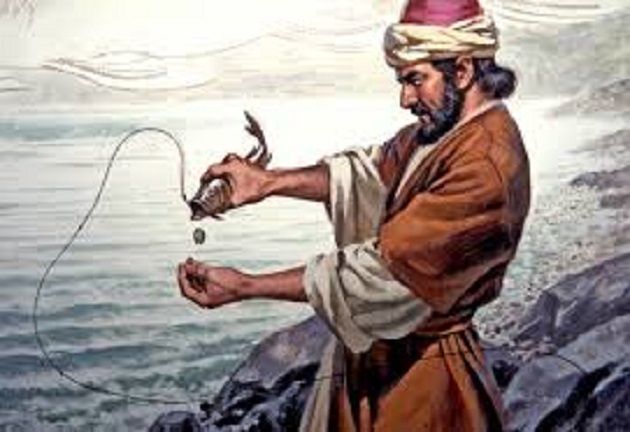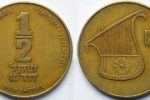THE MYSTERY OF THE FISHED COIN (part 2)
continued from 1st part

‘A piece of money’ is called statēr (stat-air’): ‘in the NT a silver stater is equal to four drachmas’. Telos and kensos are compulsory civic duties. They do not have fixed amounts. We know that the civic duties paid on twenty camel loads of goods will not be the same as three donkey loads. The very rich young man who met Jesus once (for instance) will not pay a poll tax expected from a, low income, tent making Paul of Tarsus.

Four drachmas
A statēr is four drachmas, that is, one shekel or twice the amount of a didrachmon. These two amounts of money (‘a piece of money’ and didrachmon) are ecumenical. If Jesus’ words were, “thou shalt find a piece of money: that take, and give unto them for me and thee”, you will find out that a statēr divided by two is didrachmon. Jesus paid protection money!? Why?! Simple.
Every time they went about in collection of this half shekel, they gathered it somewhere for an onward transmission to the temple. God, the Holy Spirit, was always present to keep safe, for that year, all those who were smart enough to obey Exodus 30:12. Peter came to ask Jesus concerning the half shekel issue he encountered. Jesus preempted him by asking him about money involved in civic duties, but instructed him to use the mysterious money to settle divine injunction. It was germane that Peter should be the one to fish out the stater because he is the type of a Christian. The simple reason why Jesus paid for protection is this: to free and protect those who will be born again.
Peter went out to do the bidding of his Master and found one of the collectors. He gave the stipulated half shekel – God had told them not to give more, even from a rich man. Peter definitely needed protection. Jesus, as a sinless man and Christ, the true Protector of Israel, did not need to pay for an atonement of His soul.

Stater
The stater Peter dropped made an unusual high pitched clang. Each time it was emptied into another container the sound from it was so different. Finally, it was poured forth into the treasury of the Jerusalem Temple and the Holy Spirit shouted, “Received!” Jesus actually paid for believers’ eternal protection. He did not need it. His body -Christians- need spiritual protection for their souls. He bought us with that half shekel. The Holy Spirit, the true Witness of the transaction, accepted it and God in heaven echoed, “Amen. Accepted!” Jesus paid for the souls of believers in adumbration of the gory Calvary event. When He said, “It is finished”, in John 19:30, what do think is meant by ‘finished’? It is the Greek word teleō (tel-eh’-o) [which comes from the already treated telos]: Strong’s Definition: ‘to end, that is, complete, execute, conclude, discharge (a debt)‘.

A true picture of the wounded, crucified Christ
Evidently, ‘discharged (a debt)’, in this context, is the meaning of ‘finished’ or teleō. It was not just another ½ shekel that was dropped for the safety of the life of a sinless Jesus. The significance of this didrachmon of Jesus takes care of eternal damnation. When anyone appears before the throne of the thrice holy LORD God, his sinful nature covers him all over (dramatically speaking). For the one who has gone through spiritual regeneration this is what happens. As God’s accusing, divine finger points to this saved soul, Jesus comes in front of the saved person and the Divine anger is removed, thrown into hell. Why? When Jesus paid the price pecuniarily and gorily, He went down the way of the sinners, whose evil deeds He shouldered as their Champion, to hell or hades or better still, the land of the wicked dead.
The terms of justice looked at this Personage in the land of the dead, found nothing incriminating (John 14:30, 1Corinthians 5:21, Hebrews 4:15, 1John 3:5-8 & 1Peter 2:22) in Him. His righteousness makes us righteous. God does not see our sins any more (Isaiah 1:8, 43:25; Romans 5:20; Hebrews 8:12). Jesus is the only divine insurance policy. “O the depth of the riches both of the wisdom and knowledge of God! how unsearchable [are] his judgments, and his ways past finding out!” Romans 11:33.
God knows that He will never violate His word. He does the unexpected when He decided to bind Himself with His word, in order to protect the regenerated ones (no matter what), whom Jesus has paid and paid for. God has to reflect the perfection of 2Corinthians 5:17 on us, so that when HE looks at us, HE will not see our sinfulness again, rather it is the One in the Book of Proverbs 8:30 (the Love of His Eternal Being) He will behold. Praise the LORD! (the conclusion)
To read the 1st part, click here.
Visits: 121



